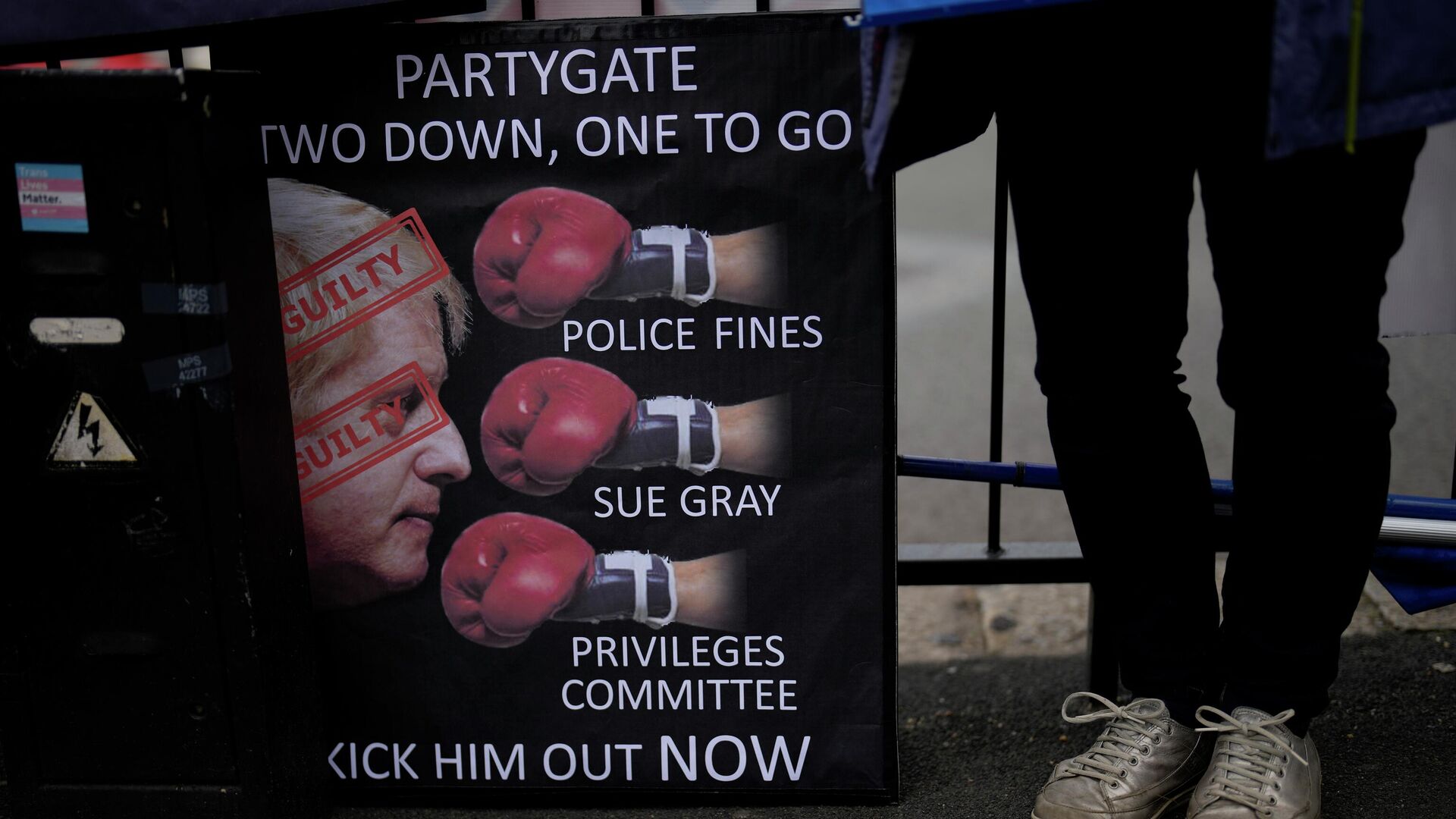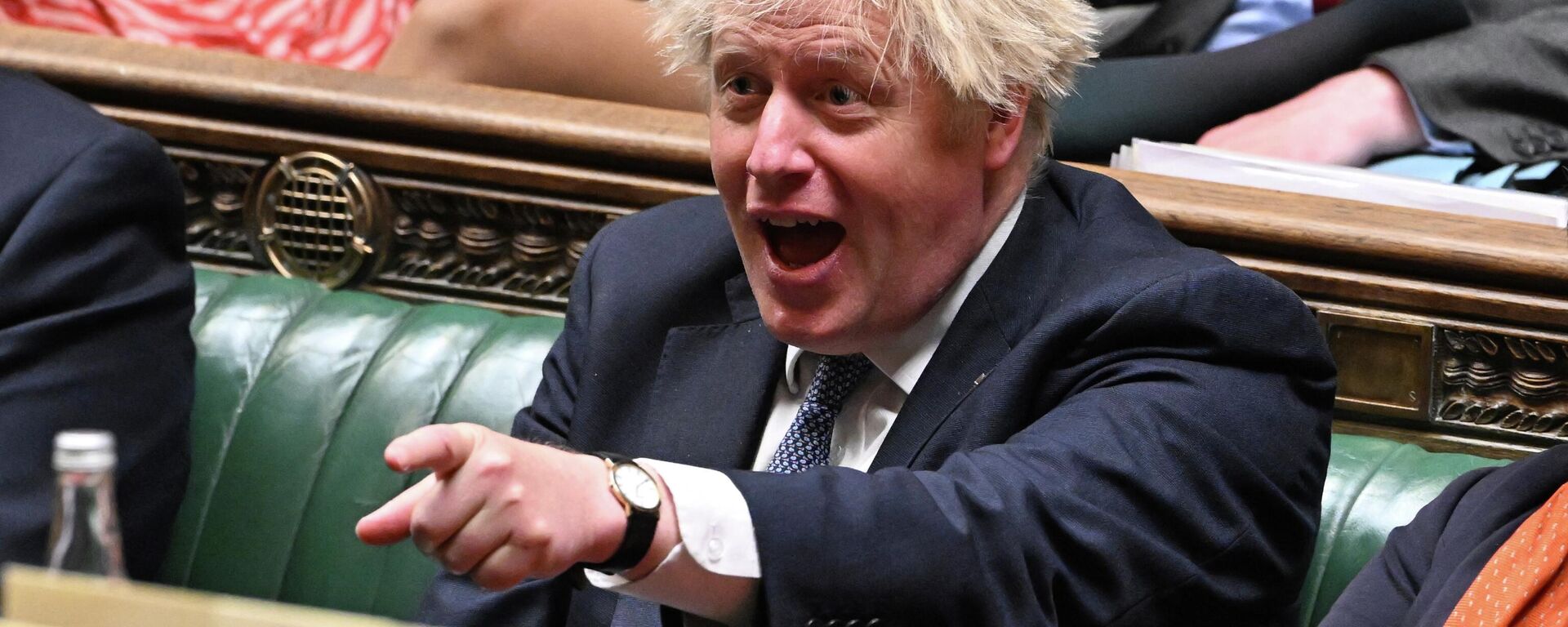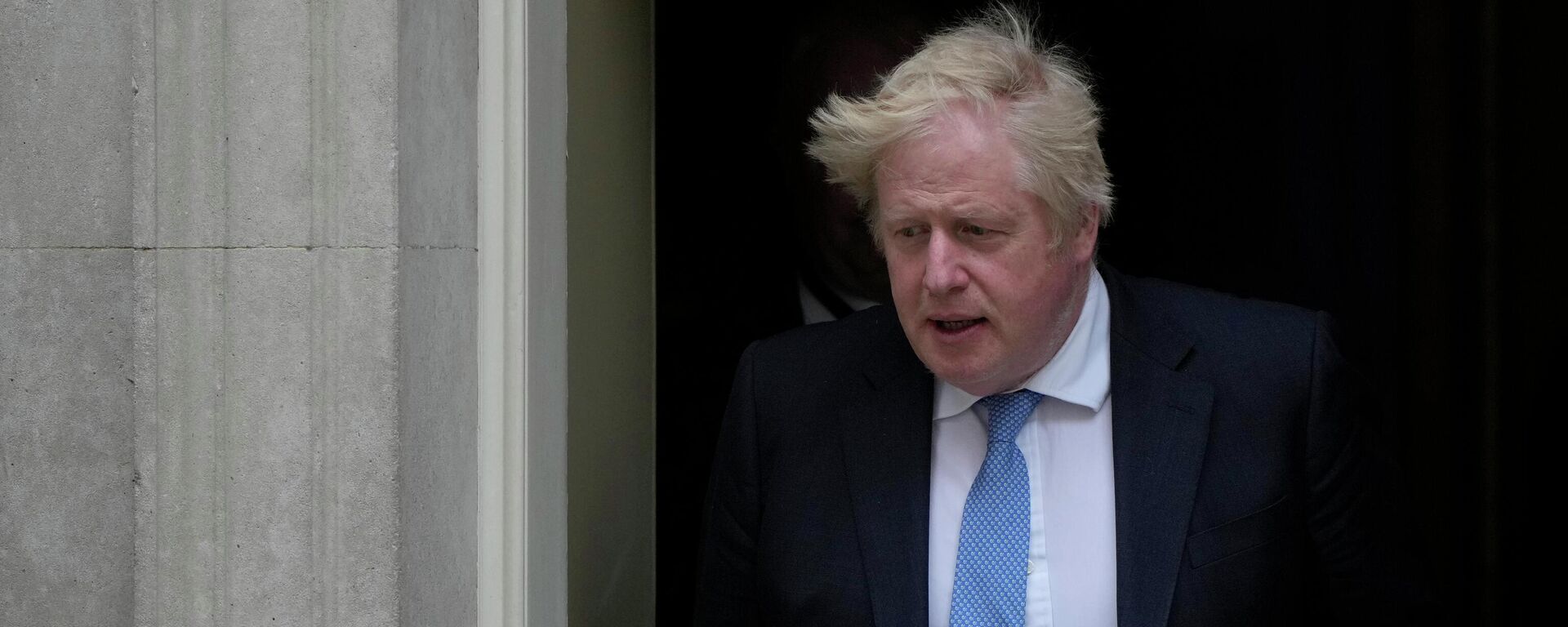https://sputnikglobe.com/20220601/wavering-mps-lobbied-to-back-bojo-as-he-faces-growing-threat-of-no-confidence-vote-report-1095914892.html
‘Wavering’ MPs Lobbied to Back BoJo as He Faces Growing Threat of No-Confidence Vote: Report
‘Wavering’ MPs Lobbied to Back BoJo as He Faces Growing Threat of No-Confidence Vote: Report
Sputnik International
Boris Johnson is in hot water following the publication of Sue Gray’s report into 16 alleged No 10 COVID rule-breaking parties held in 2020 and 2021. After the... 01.06.2022, Sputnik International
2022-06-01T09:17+0000
2022-06-01T09:17+0000
2023-05-28T15:19+0000
boris johnson
government
police
fine
report
mps
united kingdom (uk)
https://cdn1.img.sputnikglobe.com/img/07e6/06/01/1095913491_0:0:3072:1728_1920x0_80_0_0_1082059b27328a4c13f0a8bff007abf4.jpg
UK Conservative Party whips have started to phone “wavering” MPs in an attempt to secure their support for Prime Minister Boris Johnson, who faces the growing threat of a no-confidence vote amid the “Partygate” row, according to The Guardian.The purported lobbying efforts by BoJo’s allies unfold as at least 44 Tory MPs have publicly expressed doubt regarding Johnson’s ability to remain at the helm. They include 18 lawmakers, known to have sent letters of no-confidence to Graham Brady, chair of the 1922 Committee of Conservative backbenchers, in order to formally seek a confidence vote.Conservative rules stipulate that if 15% of the parliamentary party, amounting to 54 MPs, send letters to Brady, a confidence vote will be held. Johnson would then need to win the support of 180 MPs – half the parliamentary party - to remain in office.The interview followed the Guardian’s report about letters to constituents or public statements from 35 MPs who allegedly questioned Johnson’s future or voiced concern over the “Partygate” row, among them ex-ministers Richard Graham and Mark Garnier, as well as former cabinet minister Andrea Leadsom.Leadsom, who served as business secretary under Johnson, claimed for her part that the Gray report showed “significant failures of leadership, both political and official” inside No 10.“Each of my Conservative MP colleagues and I must now decide individually on what is the right course of action that will restore confidence in our government” she asserted.Downing Street responded by hitting out at what it slammed as “reckless” rebel MPs and “disgruntled ex-ministers”, warning that the “plotters” could destroy the Conservative Party's “best chance of winning the next election”, according to the Daily Mail.In the report, Gray probed 16 occasions when government staff allegedly socialised with food and drink at 10 Downing Street in breach of COVID-19 lockdown rules in 2020 and 2021, including leaving parties for three members of staff.“There were failures of leadership and judgement by different parts of No 10 and the Cabinet Office at different times. Some of the events should not have been allowed to take place. Other events should not have been allowed to develop as they did”, the report noted.The document also criticised the culture of workplace drinking that Johnson allowed at Downing Street during the lockdown, described by anonymous whistle-blowers as "wine-time Fridays".The full 60-page document was delayed until the conclusion of a London Metropolitan Police investigation that resulted in 126 Fixed Penalty Notice (FPN) fines being issued, including for Johnson, his wife Carrie and Chancellor Rishi Sunak.
https://sputnikglobe.com/20220529/tinpot-despot-boris-johnson-accused-of-pressuring-sue-gray-to-alter-her-partygate-report-1095856240.html
https://sputnikglobe.com/20220528/drip-feed-of-no-confidence-letters-in-bojo-increases-as-mps-urge-pm-to-quit-over-partygate-1095840338.html
united kingdom (uk)
Sputnik International
feedback@sputniknews.com
+74956456601
MIA „Rossiya Segodnya“
2022
Oleg Burunov
https://cdn1.img.sputnikglobe.com/img/07e4/09/0b/1080424846_0:0:2048:2048_100x100_80_0_0_3d7b461f8a98586fa3fe739930816aea.jpg
Oleg Burunov
https://cdn1.img.sputnikglobe.com/img/07e4/09/0b/1080424846_0:0:2048:2048_100x100_80_0_0_3d7b461f8a98586fa3fe739930816aea.jpg
News
en_EN
Sputnik International
feedback@sputniknews.com
+74956456601
MIA „Rossiya Segodnya“
Sputnik International
feedback@sputniknews.com
+74956456601
MIA „Rossiya Segodnya“
Oleg Burunov
https://cdn1.img.sputnikglobe.com/img/07e4/09/0b/1080424846_0:0:2048:2048_100x100_80_0_0_3d7b461f8a98586fa3fe739930816aea.jpg
boris johnson, government, police, fine, report, mps, united kingdom (uk)
boris johnson, government, police, fine, report, mps, united kingdom (uk)
‘Wavering’ MPs Lobbied to Back BoJo as He Faces Growing Threat of No-Confidence Vote: Report
09:17 GMT 01.06.2022 (Updated: 15:19 GMT 28.05.2023) Boris Johnson is in hot water following the publication of Sue Gray’s report into 16 alleged No 10 COVID rule-breaking parties held in 2020 and 2021. After the document’s release, BoJo told MPs that he takes “full responsibility” for partying but denied he had ever knowingly misled them about the events.
UK Conservative Party whips have started to phone “wavering” MPs in an attempt to secure their support for
Prime Minister Boris Johnson, who faces the growing threat of a no-confidence vote amid the “Partygate” row, according to The Guardian.
The purported lobbying efforts by BoJo’s allies unfold as at least 44 Tory MPs have publicly expressed doubt regarding Johnson’s ability to remain at the helm. They include 18 lawmakers, known to have sent letters of no-confidence to Graham Brady, chair of the 1922 Committee of Conservative backbenchers, in order to formally seek a confidence vote.
Conservative rules stipulate that if 15% of the parliamentary party, amounting to 54 MPs, send letters to Brady, a confidence vote will be held. Johnson would then need to win the support of 180 MPs – half the parliamentary party - to remain in office.
The 1922 Committee chief declined to comment in an interview with the BBC on Tuesday about whether the number of the MPs’ letters was close to the threshold. “You can always ask. I say to people they are very free to do that, and I shall retain my discretion. I can say nothing more,” he pointed out.
The interview followed the Guardian’s report about letters to constituents or public statements from 35 MPs who allegedly questioned Johnson’s future or voiced concern over the “Partygate” row, among them ex-ministers Richard Graham and Mark Garnier, as well as former cabinet minister Andrea Leadsom.
In an apparent nod to senior civil servant Sue Gray’s “Partygate” report published last week, Browne stressed that he was “dismayed by the behaviour shown by the PM and senior staff at No 10, and concur that there was a poor culture and a failure of senior leadership, both political and official. It is right they must bear responsibility”.
Leadsom, who served as business secretary under Johnson, claimed for her part that the Gray report showed “significant failures of leadership, both political and official” inside No 10.
“Each of my Conservative MP colleagues and I must now decide individually on what is the right course of action that will restore confidence in our government” she asserted.
Downing Street responded by hitting out at what it slammed as “reckless” rebel MPs and “disgruntled ex-ministers”, warning that the “plotters” could destroy the Conservative Party's “best chance of winning the next election”, according to the Daily Mail.
The developments come as Johnson’s ethics tsar Lord Christopher Geidt claimed that there was a “legitimate question” about whether BoJo’s police fine over “Partygate” represented a breach of the Ministerial Code of Conduct following the publication of Sue Gray’s report into the matter. The PM was quick to argue in a letter to Geidt that “taking account of all the circumstances”, he “did not breach” the code.
In the report, Gray probed 16 occasions when government staff allegedly socialised with food and drink at 10 Downing Street in breach of COVID-19 lockdown rules in 2020 and 2021, including leaving parties for three members of staff.
“There were failures of leadership and judgement by different parts of No 10 and the Cabinet Office at different times. Some of the events should not have been allowed to take place. Other events should not have been allowed to develop as they did”, the report noted.
The document also criticised the culture of workplace drinking that Johnson allowed at Downing Street during the lockdown, described by anonymous whistle-blowers as "wine-time Fridays".
“The excessive consumption of alcohol is not appropriate in a professional workplace at any time," Gray wrote. "Steps must be taken to ensure that every Government Department has a clear and robust policy in place covering the consumption of alcohol in the workplace”, according to the report.
The full 60-page document was delayed until the conclusion of a London Metropolitan Police investigation that resulted in 126 Fixed Penalty Notice (FPN) fines being issued, including for Johnson,
his wife Carrie and Chancellor Rishi Sunak.




